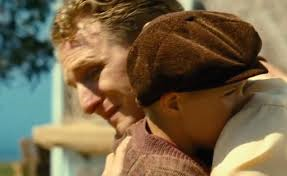More Thoughts About the Movie: “Little Boy”

I am truly amazed at some of the critics who have gone after “Little Boy.” I read one critic who said words to the effect of, “This movie is an attempt to claim the atomic bomb was justified!”
Huh?
Quite frankly, you couldn’t miss it by any more than that if you tried!
Yes, the movie has as one of its themes God can and does bring good out of the most significant of evils, but to say the movie attempts to “justify the bomb” would be like saying the Christian Faith attempts to justify the crucifixion of Christ because of its emphasis on the crucifixion of Christ.
You couldn’t miss it by any more than that if you tried!
We do not say the crucifixion of Christ is good. In fact, it is the greatest evil that could ever be perpetrated by man. We killed God, folks!
“Little Boy,” the atomic bomb that was dropped in Hiroshima, and we could add “Fat Man,” the bomb later dropped in Nagasaki as well, pale in comparison to the evil carried out on Good Friday. But the good news is this: God brought the greatest good (the redemption of all) out of the greatest evil (the crucifixion of God in Christ). And it is because of that fact that we can know that God not only can, but will, bring good out of even the terrible evil of Hiroshima, if we will but “believe the impossible.”
How anyone can watch the dream sequence where Pepper sees the devastation of Hiroshima, and come away with the movie “justifying the bomb” is befuddling to me. Pepper’s faith is tested greatly precisely because of the evil he sees! But the message shines through: “Believe the impossible!”
And, by the way, the movie does not attempt to say Pepper’s father coming home is the only good that came out of “Little Boy” being dropped on Hiroshima.
But at any rate, I do think there is a deeper point here. If one does not have faith, it is going to be more than a leap to see the profound truth of good being brought out of evil by divine power. And some criticize “Little Boy” for that fact. But I say, “Bravo!” The Boys of “Metanoia Films” are bringing faith into the mainstream! And why not? The subtitle of the movie is: “Believe the Impossible!” With man, the crucifixion/resurrection/redemption is “impossible!” It is even “absurd!” But in fact, it is true! And when you actually dig deep into the philosophy and theology undergirding the Christ event, there is nothing absurd about it. Neither is there anything truly absurd in “Little Boy” the movie.
But like it or not, the writers of this movie decided not to do all of our thinking for us. If one does not understand the most important event in the history of the created universe (Hint, hint! If you don’t know the story of Jesus Christ, you should! Hint, hint!), Little Boy is going to be hard to fathom.
Believe the Impossible
One of the many powerful messages, and I would argue, the most important message of all, communicated in “Little Boy,” merely echoes the words of Jesus Christ in Matt. 19:26: “With men this is impossible, but with God all things are possible.” And I must say I love “Little Boy” because it presents “faith” and what is a central truth of our Catholic Christian Faith (and many “truths” of the Faith as well in the many relationships and subplots in the movie) without being “in your face,” or worse, sappy, about it. I highly recommend those who have seen it, to see it again. I guarantee you there is more to uncover when you see it a second and third time. I know that happened with me, anyway. And those who haven’t seen it? You simply must see it! Here are a few thoughts I had in seeing it for a third time myself:
“Little Boy,” Pepper Busby, with his simple faith, that didn’t even begin as faith at all, impacted his own life, the lives of his big brother, London, his mother Emma, his Father, James, the town priest, Fr. Oliver, the unjustly hated town “Jap,” Hashimoto, the town bully, “Freddy Fox,” the entire town, and, perhaps, the entire world. All in an hour and forty five minutes. Can I say it? … What a movie, folks! Let’s break this down a bit so you can see what I mean by “Little Boy,” Pepper Busby, impacting his own life, as well as the lives of all around him:
1. Pepper Busby (Jacob Salvanti) – Pepper begins with the wrong motives, and with very little that could be called true faith at all. He wants to bring his father home no matter what he has to do. He tries “magic,” and then moves to incorporating a sort of “magical” view of Faith, but through a very wise priest, Fr. Oliver (Tom Wilkinson), he comes to see, and very painfully at times, that faith is not “magic;” it requires work, it requires “works,” and it doesn’t always “work” the way we want it to! Most importantly, Pepper discovers that faith “works by love” (see Gal. 5:6), and is necessarily linked to the cross (see Luke 9:23).
2. London Busby (David Henrie) – Pepper’s big brother has “issues.” He’s a good man who truly wants to do right, but hatred overpowers him, and he ends up void of both faith and love. “Little Boy’s” tenacious faith, that in the beginning does nothing but annoy and even anger London, ends up aiding Pepper’s big brother in moving from no faith, to a tremendous faith – a faith that believes the impossible is made possible – as is symbolized in these words, “You did it, you little Squirt, you did it!”
3. Emma Busby (Emily Watson) – Emma is Busby’s mom, and she is the model of strength and virtue in the movie. From the very beginning, she is the disciplinarian in the Busby family, not overly emotional, and always on track. She never wavers. She is the image of strength when she sees her husband off to war at the train station. She is the image of true love as well. A love that is a decision of the will, rather than a fleeting feeling or “warm fuzzy.”
Her stalwart persona makes it all the more powerful when she finally breaks with the news of her husband’s death. One gets the sense that Pepper’s tenacity that becomes his own “faithfulness,” comes directly from mom.
Emma’s faithfulness to her husband, and her statement, “I will always be Mrs. James Busby” in the face of advances made by Dr. Fox (Kevin James) after the news of her husband’s demise, say it all about Emma Busby. What a message for a culture today that sees marriage as little more than a contract that can be broken at the drop of a hat.
How did “Little Boy” impact his mother? Dramatically! When London’s faith falters, it is Emma who stands with her son and even in the midst of unbelievable pain, encourages his faith. Or, at least, will not stand for anyone to discourage it. Emma is moved by the faith of her son.
But perhaps more importantly, one gets the sense in this movie of how Emma and Pepper suffer together. They seem to have a unique faith and love that is head and shoulders above all others. Emma has her own suffering to deal with to be sure, but seeing her Son suffer adds to her pain, while paradoxically, it brings her consolation as well. And, of course, in the end, it brings about a miracle!
When I first saw “Little Boy,” the relationship between Pepper and his mother brought to mind the scene from the Passion of the Christ where Jesus is in the midst of unbelievable suffering and, even though his mother could hardly bear the pain of seeing her Son suffer, she comes to him. Jesus looks her in the eye and says, “See? I make all things new” (cf. Rev. 21:5). There, the Sacred Heart of Jesus and the Immaculate Heart of Mary are joined in suffering for the redemption of the world, in fulfillment of the prophecy of Simeon in Luke 2:34-35. Volumes are communicated with six words and a few seconds where mother and son simply gaze into each other’s eyes.
In a “Little Boy” kind of way, one sees how Emma and Pepper suffer in unique ways, and neither ever really falters (at least not in anything close to a definitive way), bringing about redemption in O’Hare, California! Volumes are spoken in “Little Boy” in general, but especially through the relationship of mother and son, through what is never necessarily spoken.
4. James Busby (Michael Rappaport) – We don’t see much of James in the movie, yet, Monteverde and Portillo (the writers) give all we need to know through mostly images that portray a deep love of father for son and son for father. In the very beginning of the movie, Michael and Pepper (father and son) are introduced to the audience in their acting out together imaginative and elaborate scenes of adventure they have created in their own minds all of which present the central theme of dad exclaiming, “Do you believe we can do this?” And Pepper responding, “Yes, I believe we can do this!”
If mom, Emma, is the source of Pepper’s tenacity in believing, his father, James, seems to be the source of his faith to begin with. The Father is seen as the first principle of Pepper’s faith. And that is precisely what a father is called to be!
Pepper’s impact in the life of his father is not something his father is cognizant of in the movie. But it is no less real. It is Pepper’s faith that, of course, is the source of his father’s ultimate “salvation.”
But there is much more as well. Very beautifully, and more subtly, in the end, Pepper’s faith and life become absolutely intertwined with his father, and on a much deeper level. In the end, once reunited with his father, and seeing the way his father had been gravely injured through the ravages of war, the older Pepper who narrates the story years later says of his father at that point, “We still had a long road ahead of us.” “Little Boy’s” new-found, or at least, newly-deepened, faith, along with the rest of his family’s new birth in faith and love, was not the end, but the beginning of a journey together that goes beyond the 60-mile journey back to O’Hare, California, beautifully portrayed at the very end of the movie. And Pepper Busby, even at the tender age of eight years old, seemed to have a remarkable knowledge of this truth.
5. Fr. Oliver (Tom Wilkinson) – What a masterful job Tom Wilkinson did in this movie! He is the priest/sage who is challenged to the core by the simple faith of Pepper Busby. He, along with Pepper and Emma, are portrayed as the truly “great ones” in this town.
When Pepper comes to Fr. Oliver for direction, Father struggles at times to come up with answers. And he also seems to know that he does not always have the answers. But “Little Boy” takes him to what seems to be new levels of faith even for this obviously holy and wise priest. Fr. Oliver’s faith is definitely tested, but in the end, Pepper’s adventure in faith not only confirms Father in his own faith, but gives Fr. Oliver a powerful tool for evangelism in the life of Hashimoto, the despised town “Jap,” and, atheist. This is a nice segue into #6:
6. Hashimoto (Cary Tegawa) – The relationship between Hashimoto and Pepper is absolutely beautiful. As with Pepper’s “faith” in general, his relationship with Hashimoto at the beginning is not a real “relationship” at all. He is using Hashimoto as a means to an end. In fact, he despises him and knows him only as “the Jap” due to his perception that “all Japs” are the cause of his father having to go to war! He doesn’t know, nor does he even care to know, Hashimoto’s name. He “needs” Hashimoto to get his father home.
In time, however, “the Jap” becomes a mentor, confidant, and finally, a true friend to Pepper. He eventually becomes “Hashimoto” to Pepper from whom he learns, comes to respect, and truly comes to love.
There is much to say and discover in this complex character, Hashimoto. As an atheist, he has a wonderful relationship with Fr. Oliver that is framed within an on-going game of chance (a card game) they play together regularly as they talk of the deeper questions in life. One cannot help but get a sense of “Pascal’s wager” being hinted at here.
During the on-going card game, Hashimoto and Fr. Oliver toss back and forth the deep questions about the existence of God, whether God truly intervenes in our lives through miracles, and more. All of this is centered on Pepper and his quest. Father holds his own in the discussions, but Hashimoto presents the atheist position well.
All of this leads, in the end, to a very interesting, if uncertain, conclusion. My take is, in the end, it’s not the brilliance of Fr. Oliver (though that relationship has its role to play as well), but the faith and love of Pepper Busby that seems to break through to Hashimoto. At least, it seems… perhaps. There is much to be said in this complex relationship, or in these complex relationships, between Pepper, Hashimoto, and Fr. Oliver. But consider this:
When Pepper is being taunted by the town bully, Freddy Fox, and even physically accosted, he turns to Hashimoto for help. By way of advice, Hashimoto relates to Pepper a story from his own Japanese culture of a young Samurai-in-training, a “little boy” of sorts, who was a Japanese version of a young “David” in relation to the famous “Goliath” of the Bible. “Goliath” was represented by the champion warrior of the hated “Mongols” who had invaded Japan many centuries before. And when none of the larger and more courageous Samurais could defeat this “Goliath,” it would be the “little boy” Samurai-in-training that would overcome his own fear and defeat the Mongol “Goliath.”
Here, we see a wonderful example of Little Boy learning virtue from his not only non-Christian, but atheist friend, Hashimoto. He learns a perennial truth about courage and standing up against injustice from his friend and his friend’s culture. And as a result, he does indeed overcome his fear and defeat his own “giant,” Freddy Fox, the town bully, not with a sling, or a poison dart (the weapon used by the young Samurai-in-training in the Japanese story), but with a lunchbox to the left side of the face of the bully!
Hashimoto taught Pepper the virtue of fortitude through a story, but in a beautiful turn of events, Little Boy teaches Hashimoto about the virtue of faith. After his father’s funeral, when Pepper is questioning his faith, even wondering whether or not it was “foolish,” Hashimoto, the atheist, says, “It is not foolish! It takes great courage to believe. Your father would be very proud of you!”
Wow! The atheist who had earlier claimed faith to be foolish, now says the opposite… and insistently so! We don’t get the answer to the question whether Hashimoto came to believe. But we do know that he was impacted by the courage of Pepper to “believe the impossible.” Hashimoto taught Pepper the virtue of fortitude in standing up to a bully. Pepper taught Hashimoto that there is something profoundly virtuous about faith.
7. The Town of “O’Hare, California.” One of the more ponderous aspects of this movie is found in the impact Pepper’s “faith and works” have on the entire town of O’Hare. Whether they believe or not, Little Boy forces people to make a decision one way or the other. Isn’t that what all of we Christians are called to do? Bring people to a decision?
When Pepper appears to “cause” an earthquake that “moves a mountain” in the presence of multiple eyewitnesses, the responses were presented as wonderfully varied. “That earthquake would have happened whether he prayed or not,” is the response of one, while, “That mountain over there is just a little bit further to the right than it was before…” is the response of another. Fr. Oliver and an unidentified nun think it’s a miracle, while Hashimoto and others will have none of it.
But one thing is certain, Pepper forces a decision. He impacts the entire town.
8. The Town Bully, Freddy Fox (Matthew Scott Miller). Freddy Fox is relentless in his bullying of Pepper Busby. At times, it is painful to watch. I thought of my own children being bullied and it pained me as I watched. And yet, here too, we see the impact of Pepper and his faith along with his “works.” Pepper makes “believers” of sorts out of all who were ridiculing him when be bounces his lunchbox off of the head of his tormentor, Freddy Fox.
“Christians are not pacifists,” or, perhaps, “Christians are not doormats,” are a couple of the obvious messages. There is truly “a time for war, and a time for peace,” as Eccl. 3:8 tells us. This is a much-needed message for our world today.
But one also wonders if it wasn’t Freddy Fox himself that received the most poignant message here! Perhaps he learned a lesson. A lesson of respect.
9. The World – I have read more than one critic of “Little Boy” who said words to the effect of: “God employs the atomic bomb in order to reunite a boy and his father? How ridiculous is that?” Of course, the answer is: “No, God did not ’employ the atomic bomb in order to reunite a boy with his father.'” And that is not the message of the movie, as I said above. However, there is a question here that is left to all to ponder. Can God truly use a great evil like the atomic bomb in order to bring about great good?
For Christians, the answer is obvious. But it is not obvious to the world. While many critics seem to miss the boat here, the people I have talked to get it. But it is an important question that needs to be both asked and pondered. And should we be surprised that people would object to the implications here? Of course not! The ultimate example of this truth, the cross of Christ , is said to be “a stumbling block to the Jews, and foolishness to the Greeks” (I Cor. 1:23).
Some may say the movie is too subtle with this point and that is why the critics missed the point so badly. While I respect those who say that, I personally disagree. I think this is an example of a culture that has lost the ability to tell a good story. Everything has to be laid out plainly to the viewer and it all must be entirely politically correct, or else! Hitchcock and Capra could expect to be panned in today’s Hollywood.
A Prediction
At any rate: these are just a few of my thoughts on the movie. But I will close my thoughts here with a prediction. “Little Boy” has been trashed by many critics similar to how “It’s a Wonderful Life” was panned in 1946 as “Capri-corn at its worst.” It’s truth, beauty, and goodness, were lost to the generation for which it was made. However, about 30 years later, it was re-discovered and the rest is history.
Little Boy is not taking the box office by storm. But among the thousands who have seen it (minus many of the professional critics), I hear nothing but rave reviews. I believe there will be a re-discovery even for the “critics” in years to come. The sons and daughters of today’s critics will one day appreciate “Little Boy’s” genius.
But my advice to you is don’t wait for the re-discovery. See it now, and multiple times, and then tell me whether or not you see truth, beauty, and goodness in “Little Boy.” I believe the overwhelming majority of people who actually see the movie will love it. The average Joe is, most often, better able to appreciate beauty, than the PC “experts.”






